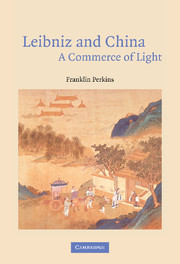Preface
Published online by Cambridge University Press: 16 November 2009
Summary
Leibniz and China? The topic usually meets with surprise. Even when people know that Leibniz had a life-long interest in China and directed his considerable energy and political skills to encouraging cultural exchange – his “commerce of light” – the topic remains strange and peripheral to the concerns of a philosopher engaged with philosophy's history. A broader interest in the place of other cultures in early modern thought meets with greater skepticism, because it seems obvious that other cultures have no place there. The reason Leibniz's engagement with China appears so surprising and worthy of attention is its contrast with the disinterest of his contemporaries. Yet our reaction of surprise should itself be surprising and worthy of attention. In the sixteenth and seventeenth centuries, information from other cultures flooded into Europe, while Europe's economy became more and more obviously global. In this context of globalization, the odd phenomenon should not be Leibniz's writings on China but that everyone else showed so little interest in the world outside Europe. How could Descartes, so interested in the nature of “man,” show no interest in the variety of human beings? How could Locke, an “empiricist,” show so little interest in the experiences of non-Europeans?
Such questions seem somehow inappropriate or unfair, not the kinds of questions with which a philosopher would approach Descartes or Locke. Why? We think of our time as uniquely multi-cultural, and surely some aspects of our time are unique.
- Type
- Chapter
- Information
- Leibniz and ChinaA Commerce of Light, pp. ix - xiiiPublisher: Cambridge University PressPrint publication year: 2004



